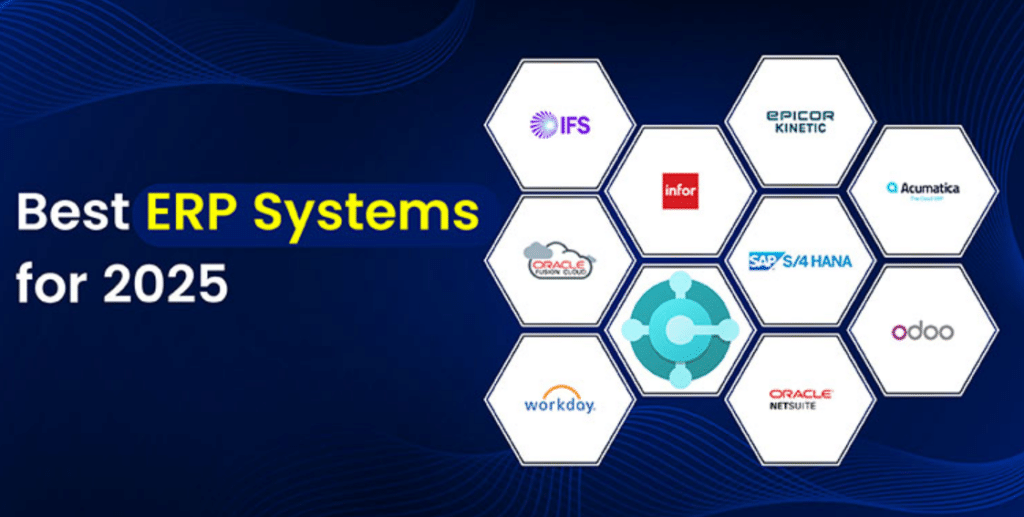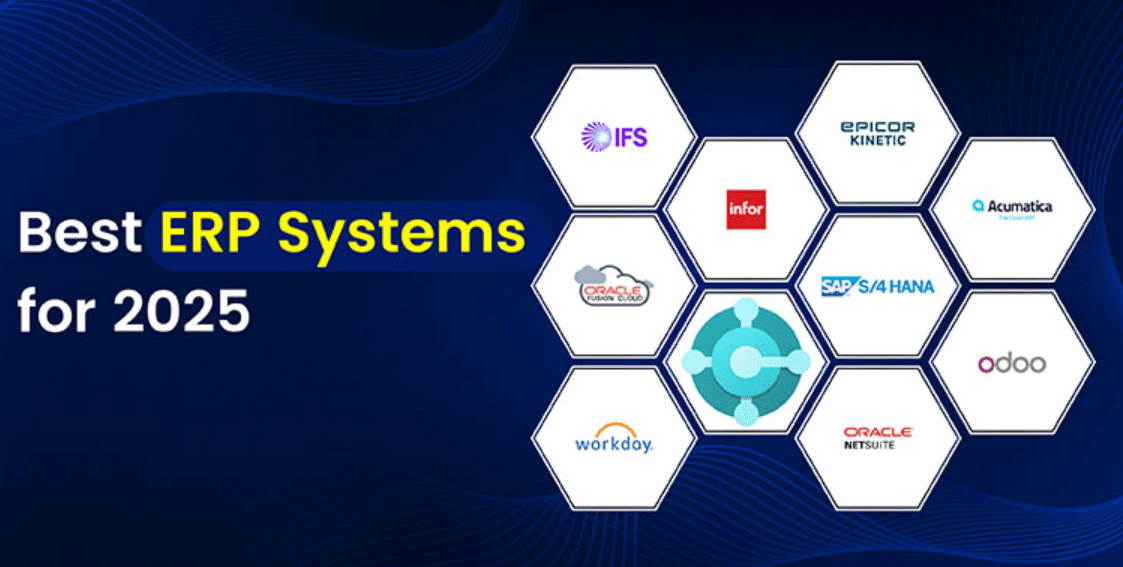Top ERP Systems: Transforming Business Operations for the Future – In today’s fast-paced, technology-driven business environment, the need for efficient management of resources and operations is paramount. Whether you run a small business or manage a large corporation, an Enterprise Resource Planning (ERP) system can significantly enhance your business operations. ERP systems integrate core business processes, offering solutions for everything from inventory management to finance, HR, and customer relationships.
However, with countless ERP solutions available in the market, how do you know which are the top ERP systems to consider for your business? In this article, we will explore the top ERP systems, their features, and how they can help transform your business operations.

What is ERP?
ERP (Enterprise Resource Planning) software refers to a suite of integrated applications that help organizations manage their core business processes in real time. Traditionally, businesses relied on disparate systems to handle functions like finance, human resources, inventory management, and more. However, ERP systems provide a unified approach, integrating all these functionalities into one system. This results in smoother operations, reduced redundancies, and enhanced data accuracy.
Why Should Businesses Invest in ERP Systems?
Investing in an ERP system can lead to significant improvements in various aspects of a business, including:
- Efficiency and Productivity: Automation of manual tasks reduces errors and time spent on administrative work.
- Data Accuracy: With all departments using the same system, businesses can ensure data consistency across the organization.
- Better Decision-Making: ERP systems provide real-time data, enabling better and more informed decision-making.
- Scalability: As businesses grow, ERP systems can quickly scale with them, adapting to new needs and more extensive operations.
- Compliance and Reporting: ERP systems come with built-in compliance features and tools for generating detailed financial and operational reports.
- For businesses looking to streamline operations, reduce overheads, and improve decision-making, ERP systems are crucial.
Top ERP Systems for 2025
1. SAP S/4HANA
SAP is a leading name in the world of ERP, offering comprehensive solutions for businesses of all sizes. SAP S/4HANA is the next-generation ERP suite that is designed to run on the in-memory database platform SAP HANA. It delivers advanced capabilities in automation, artificial intelligence (AI), and real-time analytics.
Key Features:
- Real-time analytics: SAP S/4HANA provides instant access to business data, helping managers make decisions faster.
- Cloud and On-premise Deployment: Businesses can choose to deploy the system on the cloud, on-premise, or in a hybrid configuration.
- Industry-specific solutions: SAP S/4HANA offers tailored solutions for industries such as manufacturing, retail, and healthcare.
- Machine learning and AI: With embedded machine learning, the system can predict trends and offer insights for continuous improvement.
- SAP S/4HANA is best suited for large organizations with complex operations and the need for cutting-edge technology.
2. Microsoft Dynamics 365
Microsoft Dynamics 365 is another leading ERP system that combines traditional ERP capabilities with modern CRM (Customer Relationship Management) functionalities. It offers a comprehensive solution for managing finances, operations, retail, HR, and more.
Key Features:
- Integration with Microsoft Tools: Dynamics 365 integrates seamlessly with popular Microsoft tools like Office 365, Power BI, and Teams.
- Cloud-first solution: It’s designed to leverage cloud computing, offering scalability and flexibility for businesses of all sizes.
- AI-powered insights: Dynamics 365 uses AI to analyze data and deliver actionable insights for business growth.
- Modular system: Businesses can opt for specific modules (e.g., finance, HR, supply chain management) depending on their needs, making it scalable and customizable.
- Microsoft Dynamics 365 is a strong choice for companies that already rely on Microsoft products and want an integrated solution that can grow with their needs.
3. NetSuite ERP
NetSuite, a cloud-based ERP solution owned by Oracle, is one of the most popular ERP systems for small and medium-sized businesses (SMBs). It offers a broad range of modules that cover financial management, CRM, inventory management, and more.
Key Features:
- Cloud-based: As a fully cloud-based system, NetSuite offers businesses flexibility and access to real-time data from anywhere.
- Comprehensive functionality: NetSuite covers everything from accounting to customer service, inventory management, and order processing.
- Automation: The system includes features to automate repetitive tasks like billing, reporting, and order management, saving time and resources.
- Scalability: NetSuite is highly scalable, making it an excellent choice for growing businesses looking for an ERP solution that can grow with them.
- NetSuite is ideal for growing businesses that need a cost-effective, scalable, and integrated ERP system.
4. Odoo
Odoo is an open-source ERP system known for its modular approach, offering various modules that businesses can install according to their needs. This flexibility makes it a popular choice for small to medium-sized businesses.
Key Features:
- Highly customizable: Odoo offers hundreds of apps and modules that cover all aspects of business operations, from CRM to manufacturing and HR.
- User-friendly interface: It is known for its intuitive interface, making it easy for employees to adopt the system with minimal training.
- Open-source: As an open-source platform, Odoo allows businesses to tailor the system to meet their specific requirements without paying for costly licenses.
- Cost-effective: Compared to other ERP systems, Odoo offers a more affordable pricing structure, especially for small businesses.
For small businesses looking for flexibility, affordability, and scalability, Odoo is a strong contender.
5. Epicor ERP
Epicor ERP is an industry-specific ERP solution that is highly popular in the manufacturing and distribution industries. It provides businesses with real-time data to improve operational efficiency and optimize the supply chain.
Key Features:
- Industry-specific solutions: Epicor offers tailored ERP solutions for various industries like manufacturing, retail, healthcare, and distribution.
- Cloud and on-premise deployment options: Epicor ERP is available as both a cloud-based and on-premise solution, allowing businesses to choose what works best for their infrastructure.
- Advanced analytics: Epicor provides built-in analytics tools that help businesses monitor performance and make data-driven decisions.
- Supply chain management: Epicor offers advanced features to optimize procurement, inventory, and distribution processes, making it ideal for manufacturing businesses.
- Epicor ERP is an excellent choice for manufacturing businesses that need a robust and industry-specific solution.
6. Infor CloudSuite
Infor CloudSuite is an ERP system designed for industries such as manufacturing, healthcare, and retail. It offers cloud-based solutions that enable businesses to streamline their processes, improve collaboration, and drive innovation.
Key Features:
- Industry-specific functionality: Infor CloudSuite provides specialized ERP solutions for manufacturing, healthcare, and retail industries, offering deep functionality tailored to these sectors.
- Cloud-based flexibility: As a cloud-based system, Infor CloudSuite offers flexibility, scalability, and lower IT costs compared to on-premise solutions.
- User-friendly interface: Infor’s ERP system is designed with a modern, intuitive interface to improve the user experience.
- Collaboration tools: Infor CloudSuite comes with built-in collaboration tools that allow teams to communicate more effectively.
- Infor CloudSuite is particularly beneficial for businesses in manufacturing, healthcare, and retail industries, providing specialized features for each.
Choosing the Right ERP System for Your Business
Selecting the right ERP system is crucial for the success of your business. While the top ERP systems outlined above are all excellent options, it’s essential to evaluate your business’s specific needs before making a decision.
Consider the Following Factors When Choosing an ERP System:
- Size and complexity of your business: Larger organizations with complex operations may benefit from more robust systems like SAP S/4HANA, while smaller businesses might prefer the affordability and flexibility of systems like Odoo or NetSuite.
- Industry requirements: Some ERP systems cater to specific industries, such as manufacturing or healthcare. Make sure to select a system that understands the unique needs of your industry.
- Cloud vs. on-premise: Consider whether your business requires a cloud-based ERP system for flexibility and cost savings or if an on-premise solution is more appropriate for your infrastructure.
- Budget: ERP systems can be a significant investment. Make sure to select a system that fits within your budget while still offering the functionalities you need.
- Integration capabilities: Ensure that the ERP system can integrate with your existing tools and software.
Conclusion
The right ERP system can significantly enhance the efficiency, productivity, and scalability of your business. With so many options available, choosing the top ERP system for your organization depends on your specific needs, industry, and size. By evaluating your business’s goals and challenges, you can select an ERP solution that will streamline your operations, improve decision-making, and position you for growth in the future.
The systems mentioned in this article — SAP S/4HANA, Microsoft Dynamics 365, NetSuite ERP, Odoo, Epicor ERP, and Infor CloudSuite — represent some of the best ERP systems available today. By selecting the right one for your business, you can take a significant step toward transforming your operations and ensuring long-term success.

